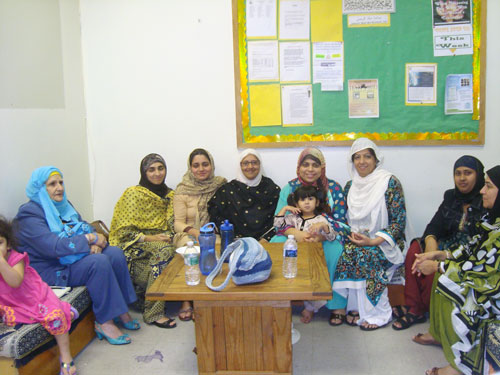By Jessica Seaman
UNC Co-Editor
the Durham Voice
thedurhamvoice@gmail.com
On the night before the 10th anniversary of the Sept. 11 terrorist attacks, about 20 women entered the Jamaat Ibad Ar-Rahman Mosque, at 3034 Fayetteville Street in Durham, by greeting each other with smiles, hugs and the Islamic greeting, “Assalamu Alaikum wa rahmatullahi wa barkatuh.”
In English the greeting means, “peace be unto you, and so may the mercy of Allah and his blessing.”

Women at the Mosque said having the community center helps them meet more people and feel like they are part of the community. They said the mosque is a place where people of all nationalities can meet and be united under one commonality—their religion. (Staff photo by Jessica Seaman)
Once inside the building, the women slipped off their shoes and entered a room where they soon stood shoulder-to-shoulder in two straight parallel lines. When the lines were formed, the women began a ritual, in which they bowed at the waist, then straighten to a standing position before eventually lowering themselves to their knees so they could place their palms, forehead and nose to the floor. When they stood back up, they repeated the process and never turned from the direction of Mecca.
It was prayer time at the mosque, and the women’s colorful headscarves—also known as hijabs—contrasted with the white room, which is sparsely decorated with shelves that hold copies of the Islamic holy text, the Quran. The room the women are in is part of a larger room that is divided by a tall temporary wall that separates men and women during prayer. The voice of the local Imam can be heard as he recites in Arabic during prayer.
The only woman who was not in line to pray was Amal Hamdy. Hamdy, 73, sits in a chair to pray because a bad back and knee prevent her from kneeling. Hamdy came to the United States in 1991 after her husband retired as a doctor in Cairo, Egypt. She said it had always been her dream to move to the U.S.
“I love the American people so much, they are so kind,” Hamdy said, adding that she had only experienced kindness during her time in North Carolina and has never be a subject to discrimination.
But that is not the case for all of the people gathered in the mosque. The women at the mosque said that the Sept. 11 attacks caused people in the community to become hesitant when they see their hijab. As the women gathered for dinner after prayer, they began to converse more freely about their different experiences and how the events of Sept. 11 affected their life in Durham.
Shehla Alam came to the U.S. in 2000 from Pakistan after her husband got a job at IBM. She said when she first arrived in the U.S., life was “perfect.”
“After 9/11 it got worse,” she said. “But now it is quite better.”
Alam was visiting Pakistan with her husband on Sept. 11.
“The next day we were coming to the U.S. and we were so scared,” she said.
Alam said her husband was so nervous about returning to the U.S. that he told her to not wear her hijab when they traveled. But Alam refused.
“I did not take it off, and when I came to the U.S.A, people’s attitude was not so good and they were making faces,” she said.
Nazli Ahmad, who also came to the U.S. from Pakistan, said most people are respectful about her religion, but after Sept. 11, people became reserved towards her and began to ask more questions about Islam.
Ahmad, who has lived in North Carolina for 28 years, said the main reason people in N.C. are uneasy around Muslims is because of a lack of education about Islam.
“People are not aware of what Islam is and what we represent,” she said, adding that the media plays a big role in how Islam and Muslims are viewed.
“The people they get [to interview] don’t give a good example,” she said. “That is why people don’t get the real picture of Islam and real Muslims, because they are getting the wrong answers. People are really interested but they are getting the wrong type of information.”
Amal Kafi,19, was born and raised in North Carolina. She said she never experienced any form of discrimination before the Sept. 11 attacks.
Kafi, who was in elementary school when the attacks happened said, “I had all of these friends and the day after, it was like people were like—don’t talk to her.”
Kafi said some children at her school would grab her book-bag and look through it saying, “let’s see if you have a bomb in here,” while others called her “towel head” and would pull her hijab off.
“I know it is a really hard time for people, but I was here too,” she said. “My friend’s family got hurt in the Pentagon. I suffered as well. I was a part of this country.”
The women at the Mosque said that the religious center is not just a place for prayer. They said it is a community gathering spot where people of all nationalities and races are unified under one commonality—their religion. And without the Mosque, it would be more difficult for them to integrate into the community.
“Like church is important for others, the Mosque is important for us,” Alam said. “Without the Mosque, it is very difficult to raise good Muslims. Mosques are necessary and should be in every state.